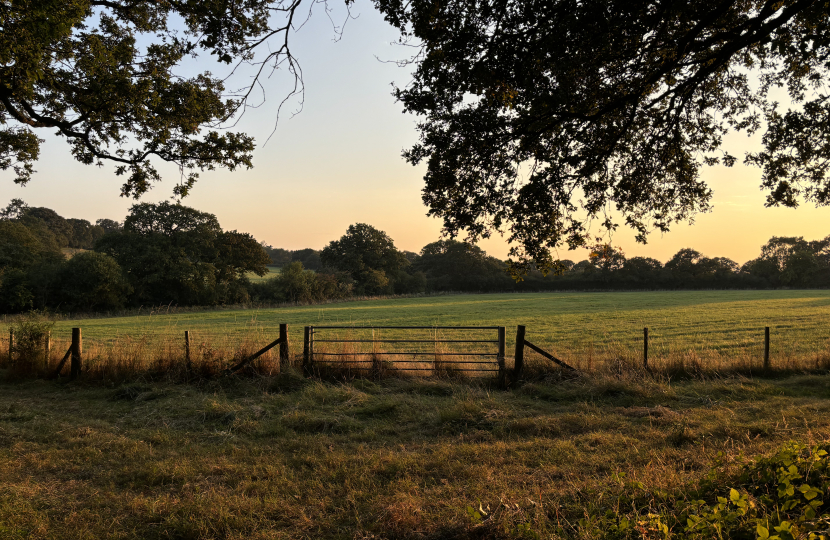
Theresa Villiers, Barnet resident and former MP, has submitted strong objections to the consultation on proposed changes to planning rules to allow development on the green belt. That consultation has been running since July and closes today.
A long-time campaigner to protect the green belt, Theresa said “Labour’s plan to allow housing to be built on land placed a new ‘grey belt’ category will drastically weaken rules which protect the green belt.”
“Green belt principles have safeguarded open spaces around our major towns and cities for decades. If these are weakened in the way proposed in the Government’s consultation, then outer suburbs like Barnet will be profoundly changed. They will no longer be places where the countryside meets the city and will become simply part of ever expanding urban sprawl.”
“Labour’s plan will also encourage landowners to run down their land and make it derelict and unsightly in the hope that this leads to be it being judged to be ‘grey belt’.”
“And it’s not just housing that Labour want to build on green belt land. They are also proposing that commercial premises and traveller sites could be constructed over our precious green spaces.”
“This is a major threat to our local environment in Barnet. I encourage people to send in objections to the consultation to make their voice heard. The deadline is today for making your views heard and playing your part in saving the green belt.”
As well as eroding green belt protection, the proposed changes to the National Planning Policy Framework will dismantle reforms put in place by Michael Gove last December to give local councils more control over the targets they set for house building and ensure homes do not have to be built at densities which are excessive and out of character with the surrounding neighbourhood. Theresa was one of the back bench MPs that secured those Gove reforms to safeguard local decision-making in planning.
The consultation can be found here and responses can be emailed to [email protected].
This is an extract from Theresa’s objection:
“I am strongly against the plans in the consultation document to weaken protection for the green belt. These safeguards have provided vital protection of the open spaces around our major towns and cities for decades.
Without the green belt, we would have seen unrestricted urban sprawl, with London stretching out and swallowing up what are now distinctive communities across the south and east of England.
Suburban areas on the edge of London (such as Barnet) will be permanently damaged if the green belt is eroded. They would no longer be outer suburbs, on the edge of the countryside. Instead they will become ever more urbanised with little to distinguish them from inner London boroughs.
Green belt rules provide crucial protection for agricultural land and for nature and conservation. The focus in the consultation on building on so-called “poor quality” land ignores the fact that sites may provide important sanctuaries for nature and wildlife even if they have been previously developed or look rundown rather than picturesque. The purpose of the green belt was always much broader than protection of scenically pleasing areas.
Allowing green belt development would harm the ability to deliver meaningful Nature Recovery Strategies, as required by the Environment Act. Green belt land, whether previously developed or not, plays a crucial part in wildlife corridors, linking habitats. The goal of the Government should be to enhance that, not undermine it.
Moreover, if sites deemed to be ‘poor quality’ are excluded from green belt protection, that provides an incentive for landowners to cause disruption, damage and flytipping in order to make their land look unattractive, with the aim of getting it released for development. This is already a problem, and the proposals in this consultation would make it far worse. A fundamental flaw in the Government’s approach is that it would incentivise and reward bad behaviour, by encouraging the degrading of open spaces valued by communities.”
On the Labour plan to reverse the December 2023 reforms, Theresa's objection states:
"The proposal to reverse the reforms introduced by Michael Gove is wrong. Mr Gove’s changes to the NPPF gave planning authorities additional flexibility to depart from centrally set housing targets. They did not abolish targets but they gave locally elected councils a greater say over target-setting and the weight to be given to targets. They gave stronger protection for the green belt. And they made it clear that significant uplifts in density did not need to be applied where this would conflict with the suburban or rural character of the neighbourhood.
These changes delivered a more balanced planning system, safeguarding local democratically accountable decision-making, whilst also providing clear incentives for councils to get a valid plan in place. I believe that providing that incentive is the best way to deliver more homes. Experience with neighbourhood planning shows that if local communities are involved and empowered in the planning process, they can be ambitious in the number of new homes they deliver.
The increased targets which are proposed in the consultation would be impossible to meet without extensive high density high rise development in areas such as Barnet for which such buildings are entirely unsuited. These new targets should not be pursued. Going ahead with them risks urbanising the suburbs and creating poor quality tower block homes.
The better approach is to concentrate dense development in the urban centres of our big cities, as set out by Michael Gove in his speech on 24th July 2023: “Our ambition in London is a Docklands 2.0 – an eastward extension along the Thames of the original Heseltine vision. Taking in the regeneration of Charlton Riverside and Thamesmead in the south, and the area around Beckton and Silvertown to the north.”
Digital imprint: Promoted by Theresa Villiers of 163 High Street, Barnet, EN5 5SU.


